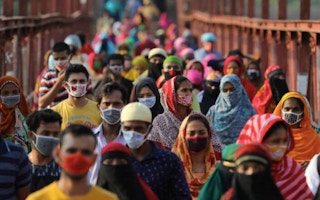Garment workers supplying global fashion brands have been underpaid or not paid at all during the coronavirus crisis, with lost wages potentially amounting to nearly $6 billion, researchers said on Monday.
With the pandemic leading to store closures and falling sales, many retailers cancelled orders or demanded discounts from suppliers, jeopardising the livelihoods of tens of millions of workers in the sector.
Pressure group Clean Clothes Campaign said garment workers in South and Southeast Asia, many already surviving on “poverty pay”, had only received three fifths of their regular income on average from March to May.
In some regions of India, workers received less than half their income, according to the group’s report “Un(der)paid in the pandemic”.
Clean Clothes Campaign, a network of labour rights organisations and unions, urged brands and retailers to stop passing the buck and publicly commit to ensuring all workers in their supply chains received what they were owed.
“The wage gaps caused by the crisis mean that workers are not able to feed their families properly,” Khalid Mahmood, director of the Labour Education Foundation in Pakistan, said in a statement.
“They are not able to pay for school fees … or pay for medical expenses and … many of them are in debt.”
Clean Clothes Campaign said a lack of data limited the research to seven countries - Bangladesh, Cambodia, India, Indonesia, Myanmar, Pakistan and Sri Lanka - but the situation was probably no better in other low-wage regions.
Extrapolating the data, researchers estimated garment workers worldwide had lost $3.19 billion to $5.79 billion in the first three months of the pandemic.
They estimated $500 million in wages had been withheld in Bangladesh and more than $400 million in Indonesia.
Bangladeshi seamstress Shorifa Begum, 25, told the Thomson Reuters Foundation she was sacked by text message in May after fellow workers protested over unpaid wages.
Begum, whose husband is too ill to work, said her former boss owed her 60,000 taka ($708), mostly in unpaid overtime – a sum equivalent to more than a third of her annual income.
“I’ve been living on loans since May. I owe money for rice and lentils to many shops and I don’t know when I can pay them back,” she said, adding she could often no longer afford milk for her toddler.
In desperation, Begum is joining another factory paying 6,000 taka a month - less than half what she used to be paid after overtime.
“It obviously won’t be enough, but I need to survive,” she said.
Clean Clothes Campaign said clothing companies had long profited from low wages in countries with lax labour laws. “We are asking brands individually to make a public commitment to avoid a situation in which everyone in a supply chain has responsibility, but in practice nobody assumes responsibility,” said Clean Clothes campaigner Christie Miedema.
Brands including Adidas, H&M Group, Primark and Ralph Lauren, unions and the International Organisation of Employers (IOE) announced a working group in April, convened by the United Nations, to help manufacturers pay wages.
“Most brands have acted responsibly, but there’s much more to do on all sides - with the brands, governments, manufacturers and retailers,” said IOE Secretary-General Roberto Suarez Santos.
Suarez Santos said they were working with governments, employers and workers in the countries cited in the report to create or boost social protection schemes.
The British-based Ethical Trading Initiative said it expected its members, who include H&M and Primark, to cover costs incurred for orders already in progress or completed and to work with suppliers to avoid cancelling orders.
This story was published with permission from Thomson Reuters Foundation, the charitable arm of Thomson Reuters, that covers humanitarian news, climate change, resilience, women’s rights, trafficking and property rights. Visit http://news.trust.org/climate.





















